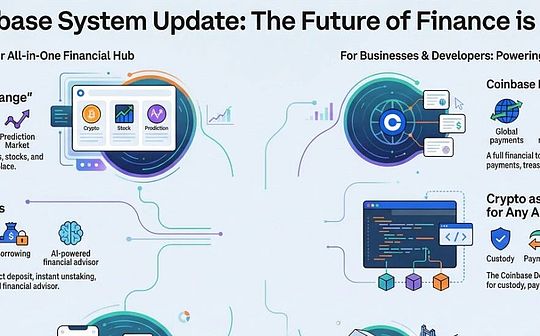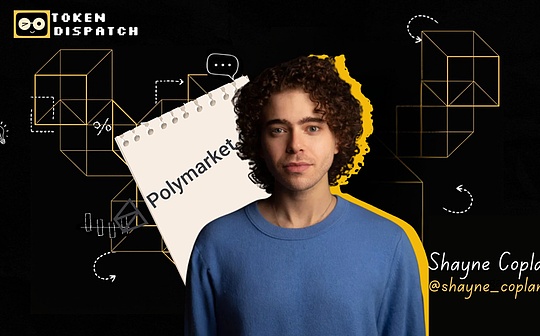
Author: Thejaswini, Source: TokenDispatch
When you have nothing, you bet on the truth.
June 2020: A penniless 21-year-old launches a prediction platform from his bathroom during the pandemic.
November 2024: FBI agents raid his apartment and seize his phone but leave without charging him.
October 2025: The owner of the New York Stock Exchange invests $2 billion in his company.
This is Shayne Coplan’s life trajectory for five years.From taking inventory of what he had in his Lower East Side apartment to sell for rent, to becoming the youngest self-made billionaire tracked by Bloomberg.
How does a man with nothing build something that regulators want to destroy?
How does a platform banned in its home country become attractive to Wall Street’s most powerful institutions?
These details are important because they reveal the actual workings behind impossible events.That’s why Coplan’s story deserves more than just a timeline, and that’s what this article will present here.
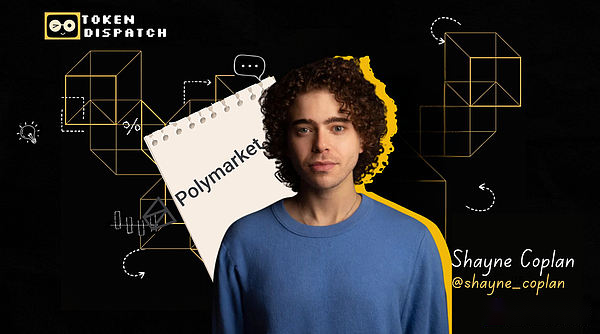
white paper moment
2019.Shayne Coplan is tired of the crypto industry.
Two and a half years after dropping out of New York University, his entrepreneurial project had gone nowhere.The promised revolution turned into what he calls a “crypto scam,” a project designed to extract money rather than create value.
He was broke and frustrated, watching an industry he once believed in turn into a casino for crooks.
So he stopped running and started reading.Academic papers, esoteric research.In particular, economist Robin Hanson’s research on prediction markets.
The theory is that markets are better at aggregating information than experts, polls, or any traditional forecasting method.When people support their beliefs with money, the collective wisdom reveals the truth.
Prediction markets have demonstrated this in academic settings.The Iowa Electronic Market has consistently outperformed traditional polls since 1988.But these platforms are still niche, academic, and inaccessible to ordinary people.
Coplan saw the gap.
“This idea is too good to exist solely in a white paper,” he wrote in the article.
He spent a year studying how prediction markets work, why they fail to scale, and what is needed to achieve mass adoption.He studied it for a year while his bank account continued to shrink.
Most people would get a job.
Then, COVID-19 shut down the world.
bathroom office
March 2020.Global lockdown.
People are stuck at home.Glued to the screen.Desperate to know what happens next.Will schools reopen?Will there be a vaccine?How long will this last?
Traditional institutions such as governments, health organizations and the media struggle to provide reliable answers.Everyone has an opinion.No one can be sure.
Coplan saw this moment clearly.
At 21, running out of money, and still accomplishing nothing after two and a half years out of school, he started building.Starting in what he later described as a “makeshift bathroom office” in his Lower East Side apartment.
June 2020.Polymarket is online.
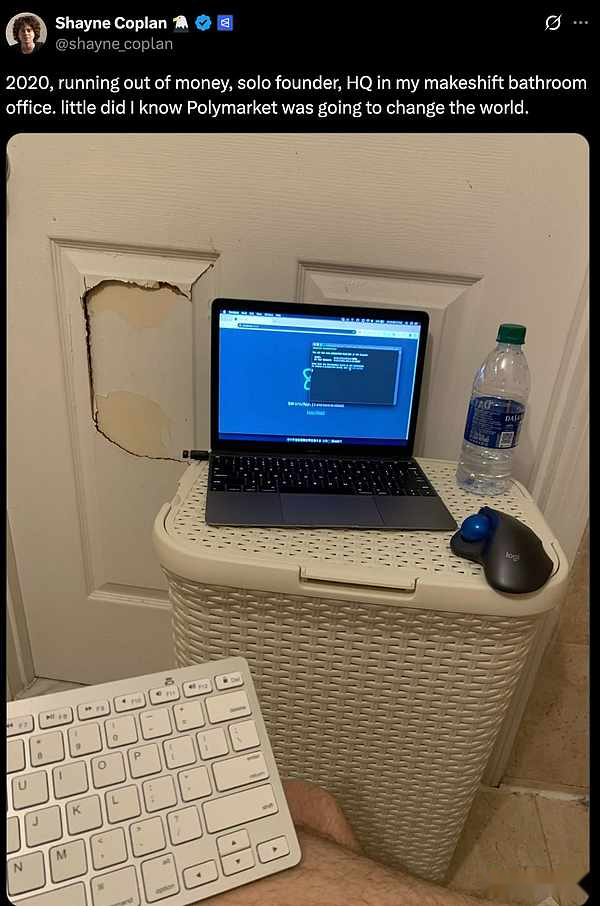
The platform is simple.Users use cryptocurrencies to make predictions about real-world outcomes.Every issue becomes a market.You buy shares that represent a “yes” or “no” outcome.You pay $1 per share if your prediction is correct and zero if you are wrong.Market prices reflect collective probabilities.
If a share trades at 65 cents, it indicates that the crowd believes there is a 65% chance of the event happening.
Pure information.There are no experts.No hype.Only faith supported by money.
Building a prediction market requires solving technical issues surrounding data feeds, market settlement, and user experience.It requires building trust among strangers, allowing them to make predictions about everything from elections to pop culture.
It also requires navigating regulatory gray areas.
To some regulators, prediction markets look like gambling, to others, like financial derivatives.Their legal status is unclear.
Coplan’s approach?Build first, ask for permission later.
This strategy worked for two years.
2022.Polymarket has attracted attention.
Transaction volumes are growing.Users are predicting everything from Oscar winners to economic indicators.The platform is gaining increasing credibility as an alternative to traditional forecasting.
Then the Commodity Futures Trading Commission came knocking.
The charges are: offering illegal trading contracts and operating as an unregistered exchange.Settlement terms: $1.4 million with no admission or denial of wrongdoing.
What’s more: Polymarket agreed to block all US users.
This limitation creates a paradox: the platform can operate globally, but not in the United States.International users can make predictions about the U.S. election, but U.S. citizens cannot participate in the market about their own country’s politics.
Regulators suspect the platform is still serving U.S. users.
2024.The presidential election is approaching.
Polymarket has become impossible to ignore.Users bet more than $3.5 billion on the election outcome.The platform consistently shows Trump leading when traditional polls show a tight race.
A French trader is betting tens of millions of dollars on a Trump victory.The trader reportedly made $85 million when Trump won.
The platform’s predictions are proven to be more accurate than traditional polls.
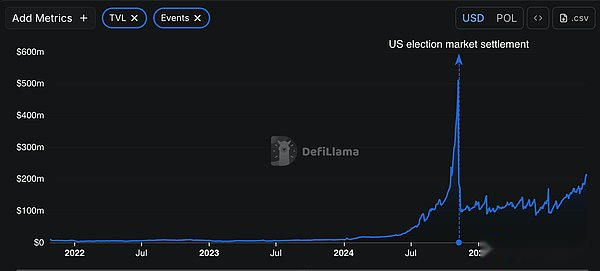
Then came that raid.
November 2024.One week after Election Day.
FBI agents arrived at Coplan’s New York City apartment before dawn.They confiscated his cell phone and electronic devices.Coplan, then 26, was not arrested or charged.
His response on X was: “New phone, who are you?”
Polymarket issued a statement: “Clearly political revenge by the outgoing administration.”
The Justice Department launched an investigation.The CFTC also launched an investigation.
The platform, which had just proven its predictive capabilities, now faces scrutiny from multiple federal agencies.
Coplan continues to build.
But in the United States, things are changing rapidly.The investigation that began under the Biden administration ended under the Trump administration.
July 2025.Both the Department of Justice and the CFTC formally terminated their investigations.No charges were filed.There are no additional penalties.
In the same month, Polymarket acquired QCEX for $112 million.
QCEX is an exchange and clearing house with a CFTC license.The acquisition provides what Coplan has been fighting for since the 2022 settlement: a legal framework to operate in the United States.
August 2025.Donald Trump Jr., son of US President Donald Trump, has joined Polymarket as an advisor through his partnership with investment firm 1789 Capital.The company, which was raided under one administration, is now being advised by family members of the next president.
September 2025.A filing with the U.S. Securities and Exchange Commission by Blockratize, Polymarket’s parent company, refers to “other warrants,” a term commonly used by crypto projects ahead of a token offering.
Coplan launches “$POLY” on X, alongside Bitcoin and Ethereum.The hint is clear: coins are coming.
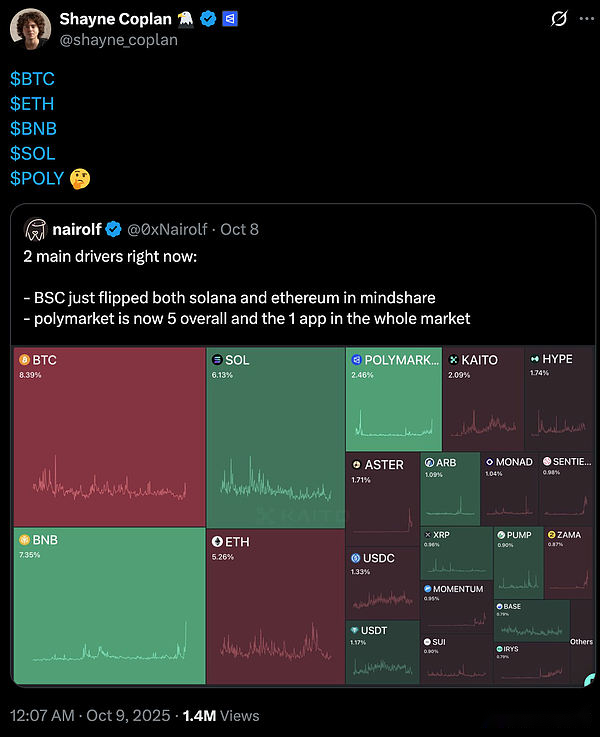
October 2025.The long-awaited announcement.Intercontinental Exchange, owner of the New York Stock Exchange, invested $2 billion in Polymarket at a pre-money valuation of $8 billion.
ICE’s CEO Jeffrey Sprecher is married to Kelly Loeffler.Loeffler is a former senator, Small Business Administration administrator and Trump Cabinet member.
The deal includes ICE’s plans to distribute Polymarket data globally and collaborate on financial tokenization projects.
The bathroom project founded by a penniless school dropout has become part of the Wall Street establishment.
Shayne Coplan, 27, joins the Bloomberg Billionaires Index as the youngest self-made billionaire.
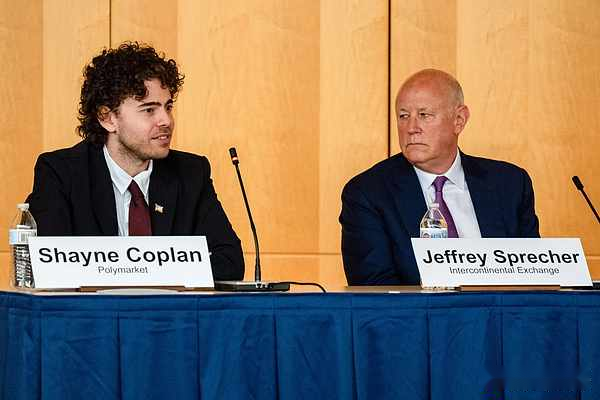
what was actually built
Polymarket solves problems that previous prediction markets could not solve.
Early platforms, such as Intrade, have proven that concepts can work.Intrade successfully predicted the 2008 and 2012 elections before shutting down in 2013.But these predecessors are still niche.They require understanding complex mechanisms and feel academic rather than mainstream.
Polymarket makes prediction markets feel like entertainment.
The interface is simple, and the questions range from the serious (Will the Fed cut interest rates?) to the trivial (Will Taylor Swift and Travis Kelce get engaged in 2025?).This mix creates engagement.
More importantly, the platform capitalizes on changes in people’s information-receiving habits.
Traditional media tells you what to think.Polls tell you what other people are thinking.Polymarket tells you what people believe and believe it enough to bet money on it.
This distinction is important to users who are increasingly skeptical of traditional institutions.
Now, the platform has more than 1.3 million users.Transaction volume is approximately US$20 billion.Monthly transaction volume exceeds US$1 billion.
The 2024 elections demonstrate the platform’s potential.Polymarket users continue to be bullish on Trump when mainstream polls show a tight race.The prediction turned out to be accurate.
It’s still debatable as to whether the platform aggregates real wisdom or simply reflects the demographics of crypto users betting on politics.But the results validate the core claim of prediction markets: Beliefs backed by money tend to reveal the truth.
Of course, as a prediction market, Polymarket occasionally has to answer truly philosophical questions, like “What is a suit?”
In June 2025, bettors bet nearly $79 million on whether Ukrainian President Volodymyr Zelensky would wear a suit by July.When photos emerged of Zelensky attending a NATO meeting wearing a matching black jacket and trousers, paired with a collared shirt (but also sneakers), the internet exploded.If the shoes are wrong, is it still a suit?If the cut is casual, does the matching fabric count?
Fashion commentator Derek Guy, brought in as an expert, helpfully declared that Zelensky’s outfit was “both a suit and not a suit,” but that solved absolutely nothing.
The market results twice sparked controversy.This is what happens when you create trustless, decentralized verification of real-world events: Eventually you need a blockchain oracle to adjudicate the semantics of tailoring, and $79 million is on the line.
What’s next?
Shayne Coplan, 27, has proven his belief that prediction markets are important.
Hints about the token indicate that the next phase is beginning.The $POLY token will complete Polymarket’s evolution from an experimental prediction market to a complete crypto ecosystem.
Token holders may receive governance rights, fee sharing, and special platform access.Specific details are unclear.But the trajectory is clear.
Token strategies carry risks.It could attract new regulatory scrutiny at a time when Polymarket is just gaining legitimacy.It could alienate users who view the platform as a prediction tool rather than a crypto project.
But it also makes strategic sense.Crypto projects issue tokens to distribute ownership, incentivize participation, and create consistency between the platform and its users.
If prediction markets represent the future of information discovery, tokens can accelerate adoption while rewarding early believers.
Coplan’s immediate plans are modest.
On Sundays, he watches American football games and tests the new Polymarket USA app.
Work continues.The predictions continue.Markets constantly reveal what people actually believe.
It took five years to go from a bathroom office to a valuation of US$9 billion.
The next five years will reveal whether prediction markets can become even bigger—becoming a new infrastructure for collective intelligence, a marketplace for truth itself.
For now, the 27-year-old billionaire is focused on execution.
Bathroom offices are a thing of the past.Financial uncertainty has been resolved.The regulatory battle has died down.
What remains is the original belief that drove him to start: prediction markets were too good an idea to exist solely in a white paper.
The market proved him right.
Time will tell what happens next.


